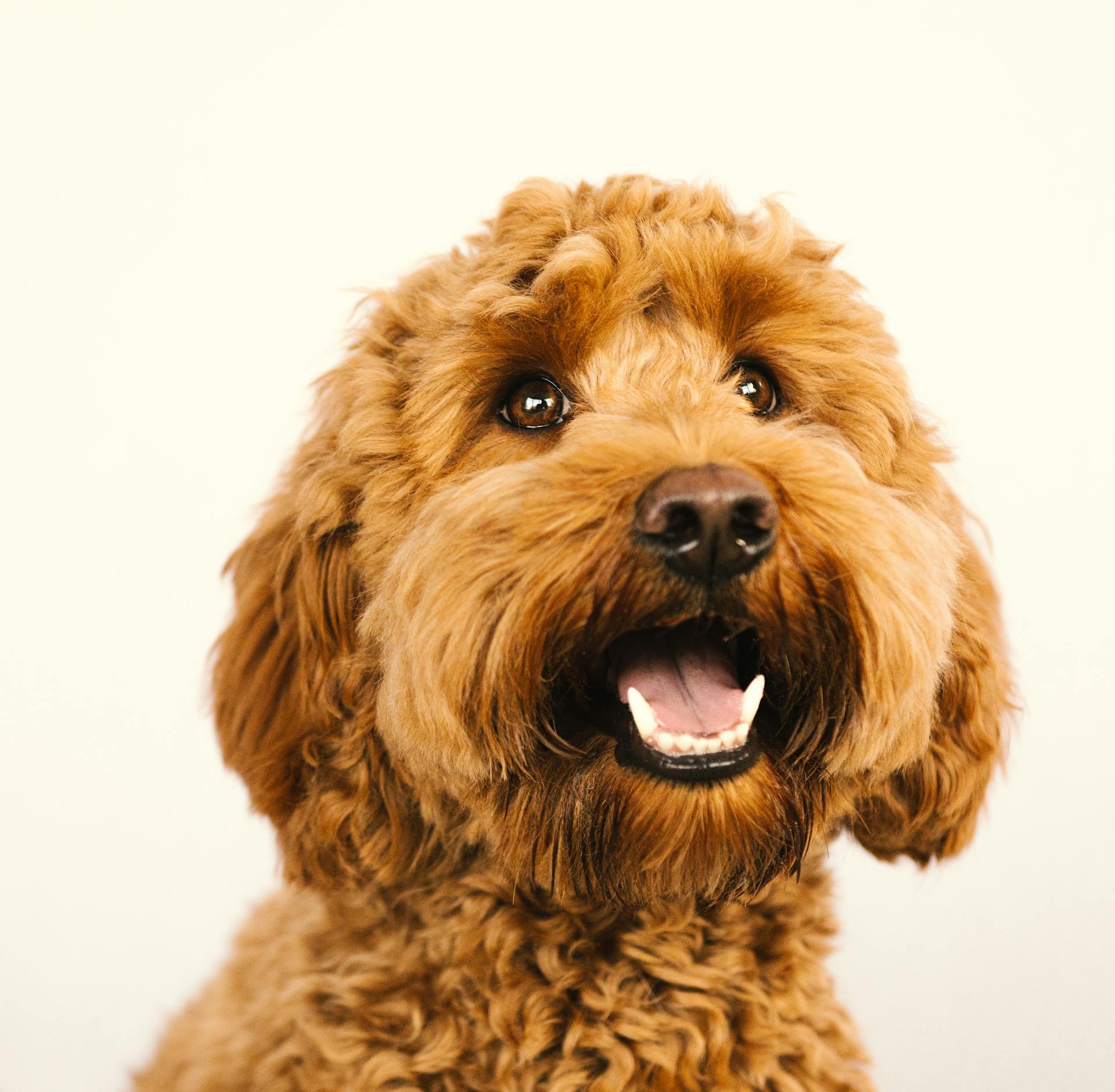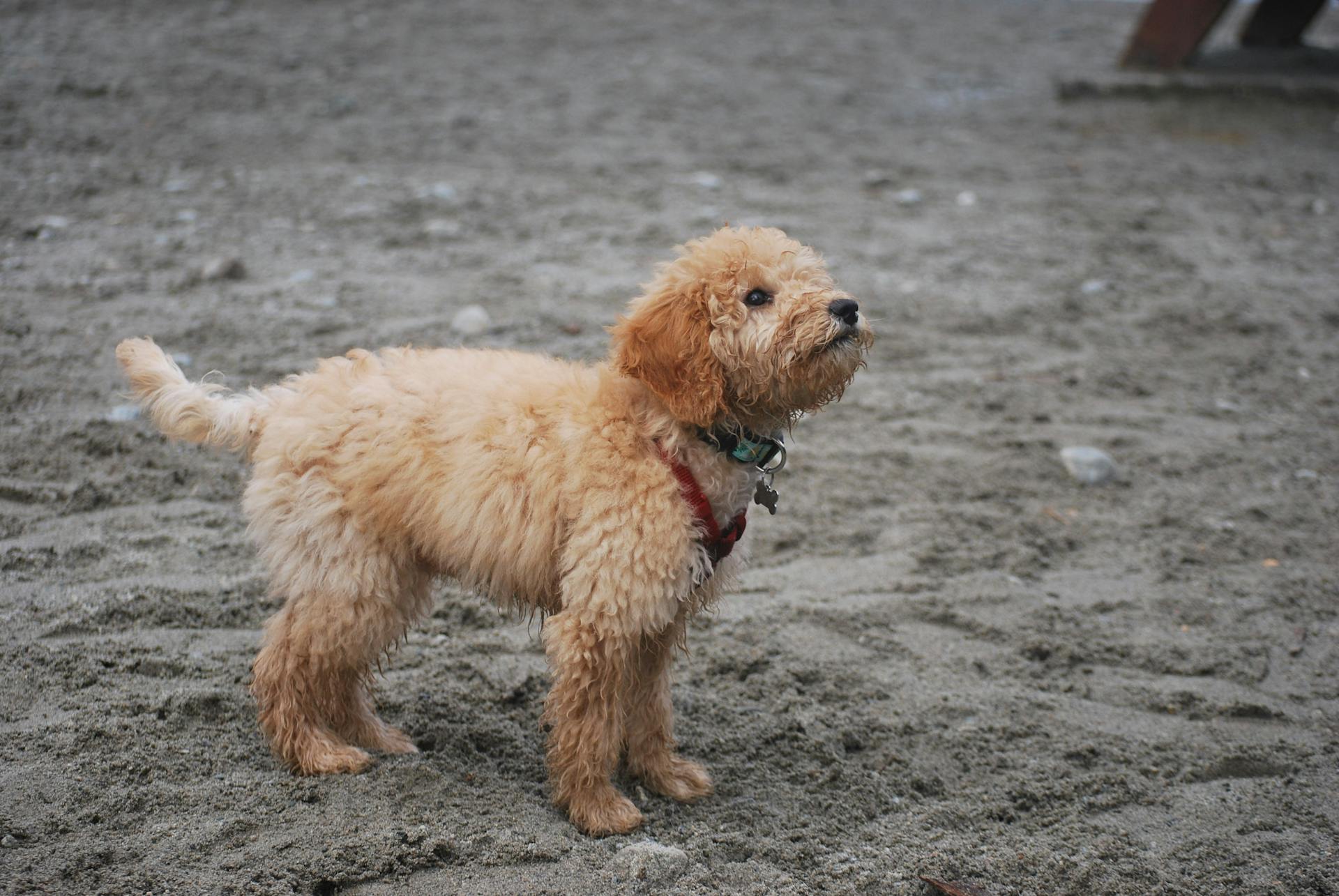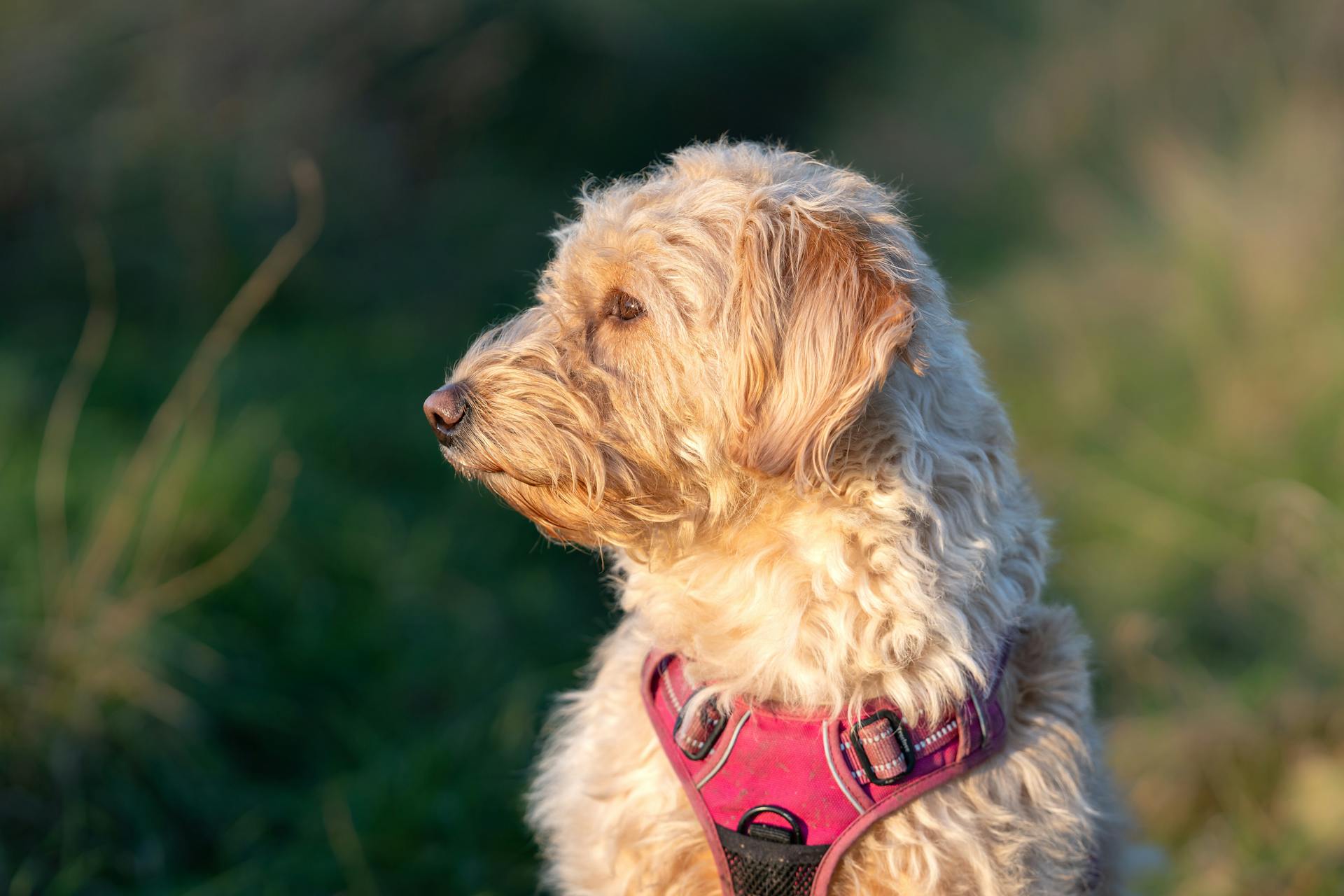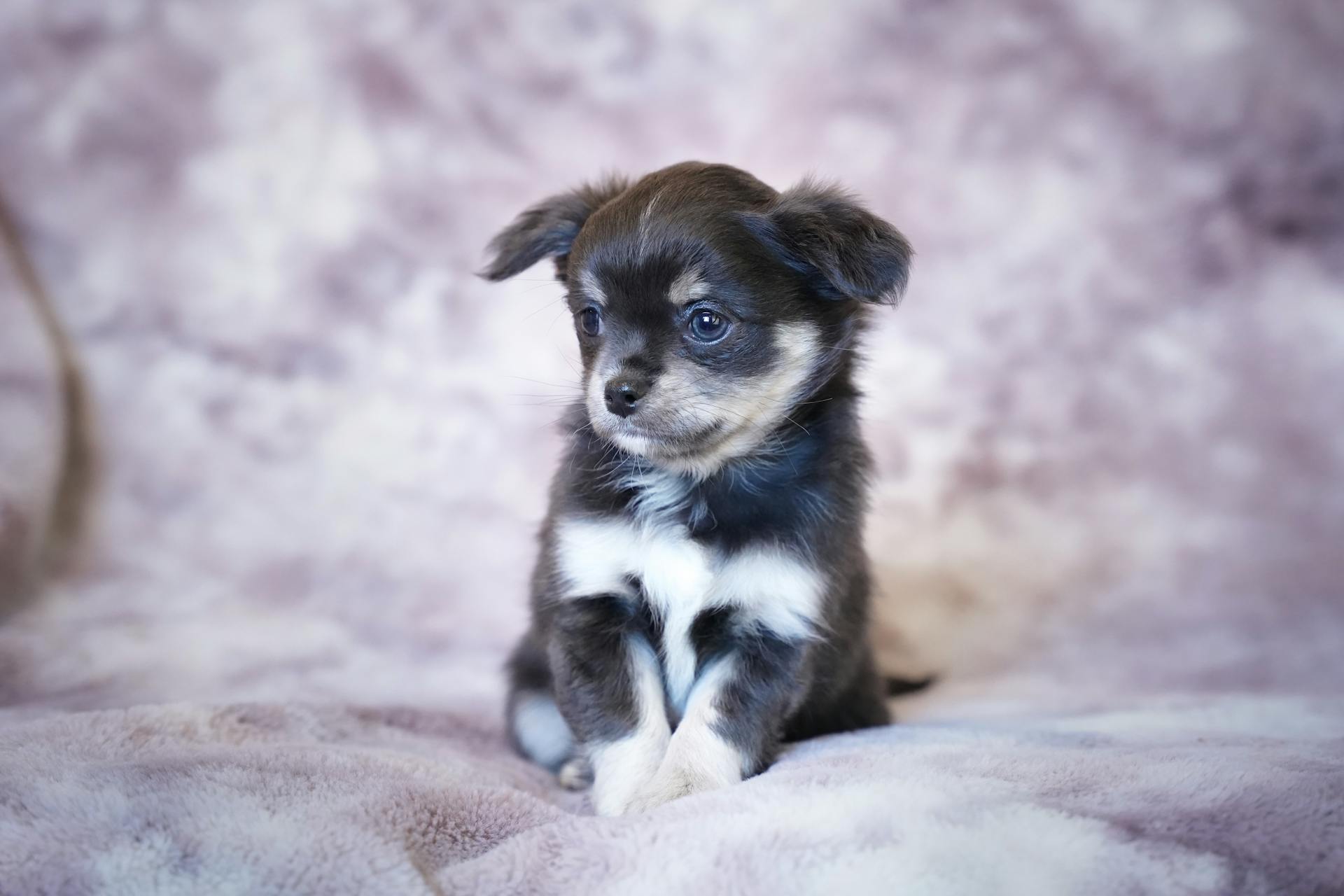
Goldendoodles are a cross between a Golden Retriever and a Poodle, typically a Standard Poodle. They're often considered a hybrid breed, which means they can inherit characteristics from both parent breeds.
One of the most distinctive features of Goldendoodles is their fur, which can be low-shedding and hypoallergenic due to the Poodle influence. This makes them a great choice for people with allergies or who prefer less dog hair.
Goldendoodles are often intelligent, friendly, and energetic, inheriting these traits from their Golden Retriever and Poodle parents. They tend to be loyal and loving companions, requiring regular exercise and mental stimulation to keep them happy and healthy.
Broaden your view: Goldendoodle vs Standard Poodle
What is a Goldendoodle?
A Goldendoodle is a crossbreed dog that combines the friendly and gentle nature of a Golden Retriever with the intelligence and trainability of a Poodle.
They are often considered a hybrid breed, created by breeding a Golden Retriever with a Poodle to produce a low-shedding, low-dander dog.
Take a look at this: English Cream Golden Doodles
Goldendoodles can be found in a variety of sizes, from Toy Goldendoodles to Standard Goldendoodles, depending on the size of the Poodle used in breeding.
Their coats can range from wavy to curly and come in a variety of colors, including gold, black, and apricot.
Their friendly and outgoing personalities make them an excellent choice for families with children, as they are patient and gentle.
Goldendoodles are highly intelligent and respond well to positive reinforcement training, making them relatively easy to train.
Their intelligence and trainability also make them a popular choice for service dogs, therapy dogs, and search and rescue dogs.
Take a look at this: Goldendoodles Good Apartment Dogs
Physical Characteristics
Goldendoodles come in a variety of sizes, ranging from standard to miniature. They can stand anywhere from 17 to 25 inches tall and weigh between 15 to 80 pounds.
Their body shape is long and muscular, thanks to their retriever parentage, and they often have a deep chest and wide stance. A goldendoodle's round skull and broad muzzle are common traits.
Their coat can be straight, wavy, or curly, with the wavy type being the most common. This type of coat is a combination of the Poodle's curly coat and the Golden Retriever's straight coat, resulting in loose, shaggy curls.
For more insights, see: When Do Goldendoodles Lose Their Puppy Coat
Size
Goldendoodles come in three different sizes: Miniature, Small Standard, and Large Standard.
The Miniature Goldendoodle is a result of a Miniature or Toy Poodle crossed with a Golden Retriever. They tend to range in size from 13 to 20 inches in height and 15 to 35 pounds in weight.
The Small Standard Goldendoodle averages 17 to 20 inches in height and 40 to 50 pounds in weight.
The Large Standard Goldendoodle is the largest of the three, averaging 20 to 24 inches in height and weighing 50 to 90 pounds.
You might like: Standard Goldendoodles
Appearance
Goldendoodles come in a range of sizes, from standard to miniature, with standard goldendoodles typically standing 20 to 25 inches tall and weighing 51 to 80 pounds.
Their body shape is long and muscular, thanks to their retriever parentage, with a deep chest and wide stance.
Goldendoodles have a distinctive coat that can vary in texture and color, with three main coat types: straight, wavy, and curly.
The wavy coat is the most common, with loose, shaggy curls, while curly coats resemble those of Poodles, with thick, curly fur.
Goldendoodles come in a variety of colors, including cream, red, black, gold, apricot, brown, and parti-colored combinations.
Here are some common coat colors found in goldendoodles:
- Cream goldendoodle
- Apricot goldendoodle
- Red goldendoodle
- Silver goldendoodle
Their coat length can range from two to three inches, with longer hair on the tail, body, ears, and legs, and shorter hair on the head and muzzle.
Goldendoodles are often considered non-shedding, but this is not an official breed characteristic, and their shedding can vary depending on their Poodle heritage.
For more insights, see: Do Goldendoodles Have Hair or Fur
Personality and Behavior
Goldendoodles are known for their friendly, intelligent, and accepting nature, making them a wonderful family companion.
Their positive personality traits are numerous, with a high level of affectionateness, gentleness, and patience. They are also highly social and enjoy human company.
Goldendoodles are highly intelligent and relatively easy to train, thanks to their eager-to-please personality. They can do well in just about any type of training and excel in service dog training.
However, they can be prone to separation anxiety, especially as puppies, which means they need regular socialization and attention. Meeting siblings or other relatives of the parents can also help evaluate what a puppy will be like when they grow up.
Their high energy levels and strong retriever instincts make them have an active mouth and high tendency to retrieve objects.
Related reading: Are Goldendoodles High Maintenance
History
The Goldendoodle's history is a story of innovation and adaptation. Breeding began in the 1990s, after the success of the Labradoodle.
The theory behind the Goldendoodle's development was to create a larger Doodle that maintained the desired low-dander, low-shedding coat. This goal was likely driven by the increasing demand for low-allergy pets.
Most Goldendoodles are the result of first-generation breeding, which means they are a mix of a Golden Retriever and a Poodle. Breeding between Goldendoodles is rare, so you're likely to encounter a first-generation Goldendoodle if you're considering bringing one home.
The lack of a breed club or registry means that there's no centralized organization to oversee Goldendoodle breeding or provide official recognition. However, online communities have sprung up to connect Goldendoodle lovers and owners.
Temperament & Intelligence

Goldendoodles are extremely loving, gentle dogs. They love to play and form strong bonds with their owners. Besides their teddy bear-like features, Doodles are also known as smart and eager to please pups, making them relatively easy to train.
Their temperament is affected by a number of factors, including heredity, training, and socialization. Puppies with nice temperaments are curious and playful, willing to approach people and be held by them.
Goldendoodles predominantly exhibit high levels of energy, loyalty and playfulness; they are often friendly with children and considered a good family pet. However, this friendliness and loyalty can also lead to separation anxiety, especially as puppies.
They are highly intelligent and are relatively easy to train given their eager-to-please personality. You'll want to start them in a puppy training program first so they can learn basic commands.
Goldendoodles are sensitive and will respond much better to "gentle parenting" methods instead of harsh training techniques.
Check this out: How to Train Goldendoodles
Care and Maintenance
The Goldendoodle's temperament makes him a breeze to train, as long as you use positive reinforcement. He's a quick learner and eager to please.
To keep your Goldendoodle happy and healthy, he needs daily exercise, which can be as simple as a 20-30 minute walk or a romp in the backyard. He's also a natural swimmer, so if you have access to a pool or a lake, that's a great way to get him moving.
His coat requires regular grooming, but the good news is that he's a low shedder. You can either clip his coat for easier maintenance or brush it once a week or two to keep it looking its best. Just be sure to brush his teeth at least two or three times a week to prevent tartar buildup and gum disease.
A fresh viewpoint: Can You Breed Two Goldendoodles
Grooming
Grooming is an essential part of Goldendoodle care, and it's crucial to establish a routine from an early age.
The Goldendoodle's coat can be a wavy to curly coat of about two to three inches in length, with longer hair on the tail, body, ears, and legs.
To maintain their coat, owners often opt to clip it for easier maintenance, but if you choose to leave it in its natural state, expect to brush it about once every week or two.
Daily brushing is even better if you want to prevent gum disease and bad breath. Brushing their teeth at least two or three times a week will also help remove tartar buildup and bacteria.
Trim nails once or twice a month if your dog doesn't wear them down naturally to prevent painful tears and other problems. Dog toenails have blood vessels in them, and if you cut too far, you can cause bleeding.
Your dog's ears should be checked weekly for redness or a bad odor, which can indicate an infection. Wipe them out with a cotton ball dampened with gentle, pH-balanced ear cleaner to help prevent infections.
Begin accustoming your Goldendoodle to being brushed and examined when he's a puppy. Handle his paws frequently, and look inside his mouth. Make grooming a positive experience filled with praise and rewards.
Broaden your view: How to Clean a Goldendoodles Ears
Care
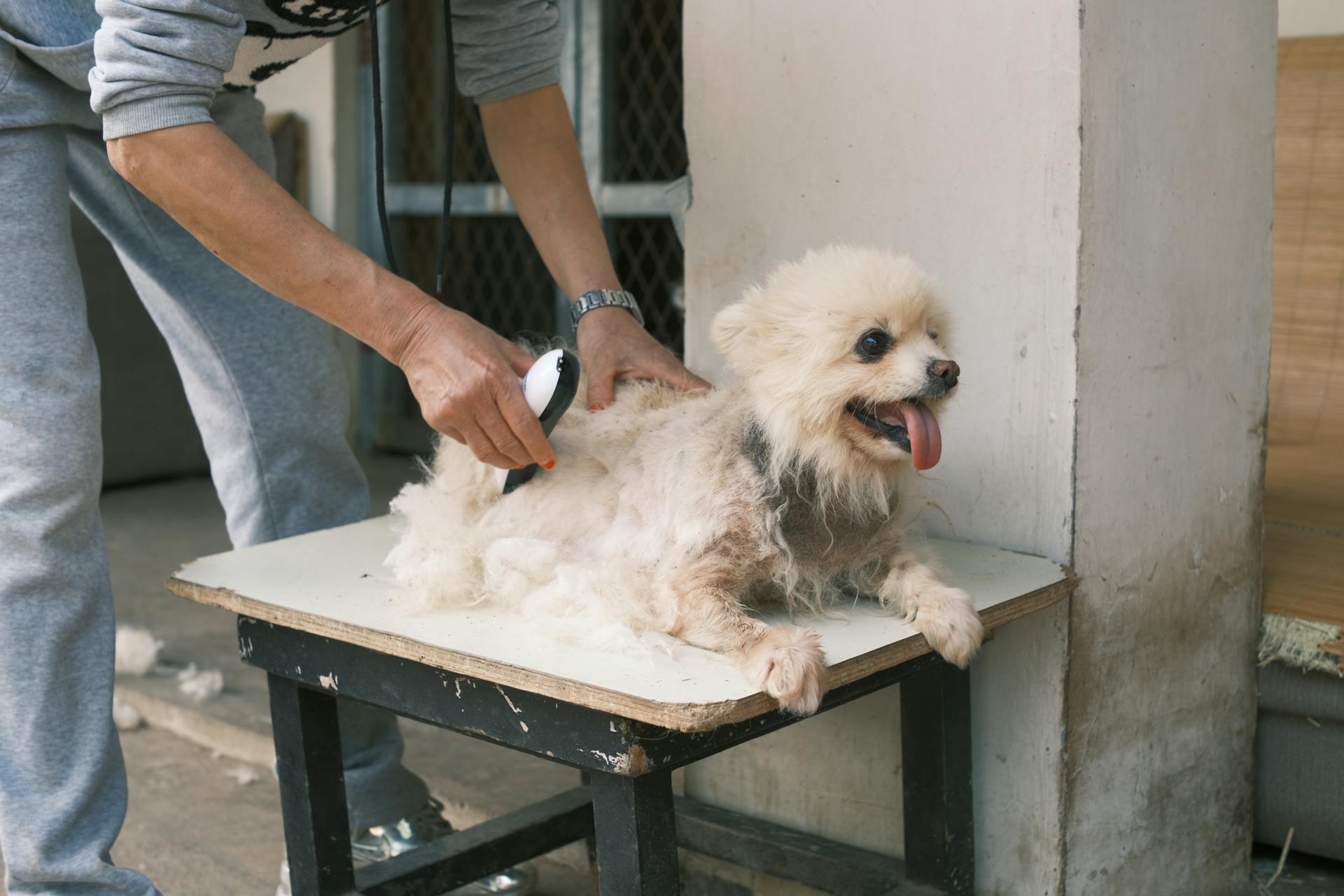
Training a Goldendoodle is a breeze, thanks to their intelligent and eager-to-please nature. They thrive on positive reinforcement, so harsh corrections are a no-go.
Socialization is crucial for this breed, and it's a great way to discourage shyness or timidity. They're gentle souls, after all.
Daily exercise is a must, with 20 to 30 minutes of activity keeping them happy and engaged. A romp in the backyard or a swim in the pool will do the trick.
The Goldendoodle has a moderate energy level, so they don't require hours of exercise like some breeds do. Two hours a day is plenty, but they'll still enjoy games, training, and interactive toys.
They need room to move, so a fenced yard is a must – apartments aren't ideal for these dogs. They thrive on family interaction, so expect to keep them indoors most of the time.
Separation anxiety can be a problem, so it's essential to provide plenty of attention and interaction. Leaving them alone for long periods can lead to destructive behavior.
Here's an interesting read: Why Are Goldendoodles so Expensive
Health

Regular exercise can help reduce stress and anxiety, a common cause of hair loss, with studies showing that 30 minutes of moderate exercise a day can lead to significant improvements in mental health.
Exercise also boosts the immune system, which is vital for preventing illnesses that can cause hair loss, such as alopecia areata, which affects 2% of the population.
Staying hydrated is essential for healthy hair growth, with even mild dehydration causing hair to become brittle and prone to breakage.
Drinking at least 8 cups of water a day can help to keep your hair looking its best.
A balanced diet rich in vitamins and minerals, particularly those found in leafy greens like spinach and kale, can promote healthy hair growth and reduce the risk of hair loss.
A study found that people who ate a diet rich in fruits and vegetables had a 30% lower risk of hair loss compared to those who didn't.
Getting enough sleep is crucial for hair growth, with research showing that people who sleep for 7-9 hours a night have longer and thicker hair than those who sleep less.
Readers also liked: How to Cut a Goldendoodles Hair
Family and Pet Compatibility
Goldendoodles make wonderful family pets, especially if they inherit the Golden Retriever's patient and gentle nature. They get along well with children of all ages and can thrive in homes with other dogs and pets.
As with any breed, it's essential to teach children how to approach and touch dogs gently and to supervise interactions between dogs and young children. Never leave a dog unsupervised with a child, even if the dog is friendly.
A Goldendoodle's adaptability makes them suitable for any family lifestyle, from small apartments to large farms, as long as their basic needs are met. They'll happily play and snuggle with small children or lounge around the house waiting for their owners to return.
For more insights, see: Are Mini Goldendoodles Easy to Train
Breed Puppies
If you're looking to bring a new furry friend into your family, you'll want to consider getting a breed puppy. Goldendoodle puppies are a popular choice, and with a little research, you can find a reputable breeder through the Goldendoodle Association of North America (GANA).
Goldendoodle breeders through GANA live up to high standards, ensuring the parent dogs have had their health clearances. This gives you peace of mind knowing exactly what you're getting into.
You may be able to find a Goldendoodle in a shelter, but it's not a guarantee, so be prepared to check daily for availability.
Children and Pets
Having children and pets can be a wonderful experience, but it's essential to teach kids how to approach and touch dogs gently to prevent any biting or ear or tail pulling on either party.
Goldendoodles, in particular, are known for their patience and gentleness, making them a great fit for families with kids of all ages. They get along well with children, but it's crucial to supervise interactions and teach kids how to interact with dogs properly.
No dog, no matter how friendly, should ever be left unsupervised with a child. Always supervise interactions between dogs and young children to prevent any biting or ear or tail pulling.
Explore further: Goldendoodles Hypoallergenic Dogs
A bored or untrained Goldendoodle can easily become unruly and overly boisterous, so be sure to provide them with plenty of exercise and mental stimulation. This will help keep them happy and well-behaved around children.
In fact, Goldendoodles can thrive in homes with small children, who will love having a pet to play and snuggle with.
Popularity and Uses
Goldendoodles have become incredibly popular in recent years, and it's no surprise why. They're primarily bred as companion dogs, but their intelligence and trainability make them suitable for various roles, including therapy dogs and guide dogs.
In the United States, goldendoodles have gained immense popularity, especially in regions where they're considered one of the most popular dog varieties. Their popularity has also led to a significant increase in prices, with some puppies selling for as much as $15,000 AUD in Australia by September 2020.
The demand for goldendoodles has been fueled by the COVID-19 pandemic, which led to a surge in pet ownership. This increased demand has resulted in higher prices for these lovable dogs.
Here's an interesting read: How Popular Are Goldendoodles
Frequently Asked Questions
What are the pros and cons of a Goldendoodle?
Goldendoodles are friendly and sociable, but may develop social anxiety. They have a hypoallergenic coat, but may still cause allergic reactions in some people, and have moderate shedding levels.
What are Goldendoodles mixed with?
Goldendoodles are a cross between Golden Retrievers and Poodles, combining the best traits of both breeds. This unique mix makes them a popular choice for families and individuals seeking a loyal and intelligent companion.
What are Goldendoodles bred to do?
Goldendoodles are primarily bred as companion dogs, but they can also be trained for various assistance roles, such as therapy, guide, and nut-detection work. Their versatility and trainability have made them a popular choice for many dog owners and handlers.
Why were Goldendoodles originally bred?
Goldendoodles were originally bred to provide guide dogs for visually impaired people with allergies. They were created by crossing poodles with golden retrievers to produce hypoallergenic dogs.
Do Goldendoodles bark a lot?
Goldendoodles tend to bark excessively if they're bored, anxious, or lacking training. Regular interaction and stimulation can help minimize excessive barking in this breed.
Featured Images: pexels.com
